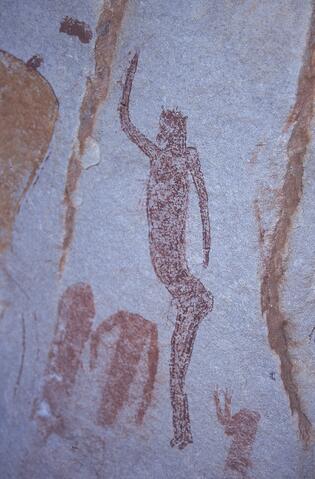Identity area
Reference code
Title
Date(s)
- 01/12/1997 (Creation)
Level of description
Extent and medium
Context area
Name of creator
Biographical history
Brief description of site: This 25 m long, high and commodious protruding rock shelter - one in a concatenation of sites along the same contour. Considerable waterborne sand has been deposited in the cave from flooding, covering some of the rock-paintings on the lower levels. The sandstone has a lot of hard quartzite admixture and the site has an upper ledge level on which most of the rock-paintings occur.
The waterborne sand has covered most of the primary archaeological deposit. Surface scatters of lydiante (hornfels) and crypto-crystalline silicates (opalines) are present in some numbers. There are cores, chips and chunks as well as finished artefacts such as flakes, scrapers and burins, suggesting that this was a large and important centre for the San or Bushmen who lived there. Together with the many rock-paintings, this richness of material culture suggests that Stow's Cave was a asocial and ritual aggregation centre for different San groups who periodically came together for purposes of trade, visiting, arranging marriages, gift exchange, intensified ritual and symbolic activity and so on. Because of the regular flooding of the site the preservation of inorganic remains such as bone, ostrich eggshell, leather and fibre is unlikely. There are also at lest 6 grinding patches on the rocks suggesting the grinding of plant food and perhaps pigment such as ochre.
Brief description of art: Finger dots.
There are in excess of 350 individual rock-paintings that fall into two different types:
San or Bushman rock-paintings: These make up over 80% of the surviving paintings. Most of these paintings are painted exclusively or in combinations of red, black, white and varying shades of yellow or orange paint. Subjects depicted include depictions of baboon, cattle, eland (Tragelaphus oryx), felines, indeterminate antelope, human figures - some with spears - also human figures bending forward covered in karoses, many bags and quivers a large coiled serpent, and some large animals, some of which may represent the rain-animal. Significantly, at least 6 of the human figures have both animal and human physical attributes and are known as therianthropes - part-human, part-animal transformed medicine people or shamans. There is a great deal of activity in the art, which runs for over 20 m and a great deal of material culture in the form of bows, arrows, sticks, spears, clothing, bags and so forth is shown. These rock-paintings range in size from 25 mm to just over a metre for the large serpent.
Khoe rock-paintings: On close inspection, it can be seen that some of RSA LOR1 rock-paintings are non-representational and take the form of finger-drawn lines and dots - often placed in rows. This schematic art is distinct from the San art. It is not applied with a brush and it does not represent animals or human figures. They occur both on top of and underneath the San art, suggesting the makers of this art inhabited the same landscape as the San. These makers were the Khoe (Khoi) - a society of herders who had stock but who did not plant. The Khoe moved into the Cathcart area between 1 200 - 16 00 years ago, following the river courses that they may have water and feed for their stock.
Name of creator
Biographical history
Nationality: South African
Created by: azizo
Created on: 18/02/2003
Name of creator
Biographical history
Name of creator
Biographical history
Repository
Archival history
Date donated to: 17/08/1995
Immediate source of acquisition or transfer
Content and structure area
Scope and content
Appraisal, destruction and scheduling
Accruals
System of arrangement
Conditions of access and use area
Conditions governing access
Conditions governing reproduction
Language of material
- English
Script of material
Language and script notes
Physical characteristics and technical requirements
Original size: 35mm

